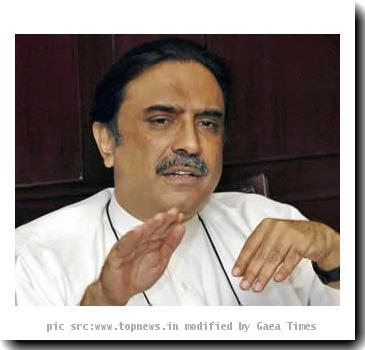UN accepts Pakistani request to delay release of report on Benazir Bhutto assassination
By Edith M. Lederer, APTuesday, March 30, 2010
UN delays Bhutto assassination report
UNITED NATIONS — Secretary-General Ban Ki-moon on Tuesday accepted a request from Pakistan’s president to delay the release of a report on the assassination of his wife, former Prime Minister Benazir Bhutto, until April 15.
U.N. spokesman Martin Nesirky made the announcement just two hours before a three-member U.N. commission that investigated Bhutto’s death was scheduled to hold a press conference to discuss the report’s findings.
Nesirky said he did not know why Pakistani President Asif Ali Zardari made the request, which was received at the U.N. overnight.
But Pakistan’s presidential spokesman, Farhatullah Babar, said the country had requested the delay so the commission could attempt to question two heads of state who he said had called Bhutto before her death warning her of “serious threats to her life.”
He declined to say which heads of state he was referring to, saying it would be unethical. It was unclear why the commission had not spoken to them.
“This can make the report more credible,” he told the AP in Islamabad.
Bhutto was killed in a Dec. 27, 2007, gun and suicide-bomb attack as she was leaving a rally in the garrison town of Rawalpindi, where she was campaigning to return her Pakistan People’s Party to power in parliamentary elections.
The government at the time of Bhutto’s murder, led by President Pervez Musharraf, blamed Baitullah Mehsud, a Pakistani militant commander with reported links to al-Qaida. Officials at the U.S. Central Intelligence Agency also said Mehsud was the chief suspect.
But Bhutto’s party repeatedly hinted that Musharraf or his allies were involved and demanded a U.N. probe, claiming it was the only way the whole truth would be revealed.
The secretary-general agreed to appoint a commission to assist Pakistan by determining the facts and circumstances of Bhutto’s death and it began work on July 1, 2009.
Nesirky said the commission informed Ban that “all relevant facts and circumstances have been explored and the report is now complete and ready to be delivered.”
The three-member commission is led by Chile’s U.N. Ambassador Heraldo Munoz, a dissident during the dictatorship of Gen. Augusto Pinochet. Munoz declined to comment on the delay.
The other members are former Indonesian attorney general Marzuki Darusman, now a member of the National Commission of Human Rights, and Ireland’s former deputy police commissioner Peter Fitzgerald, who headed the initial U.N. inquiry into the assassination of former Lebanese Prime Minister Rafik Hariri in 2005.
Under terms agreed to by the U.N. and the Pakistani government, the commission was to determine facts and circumstances but Pakistani authorities would determine any criminal responsibility.
Zardari succeeded Musharraf as president in September 2008 and when Ban visited Pakistan in February 2009 the president told government officials: “We believe the commission’s findings will eventually expose the financiers, the organizers, the sponsors and the conspirators of this terrorist act and bring them to justice.”
Associated Press Writer Chris Brummitt contributed to this report from Islamabad, Pakistan.
Tags: Asia, Asif Ali Zardari, Islamabad, Pakistan, South Asia, United Nations, Violent Crime

